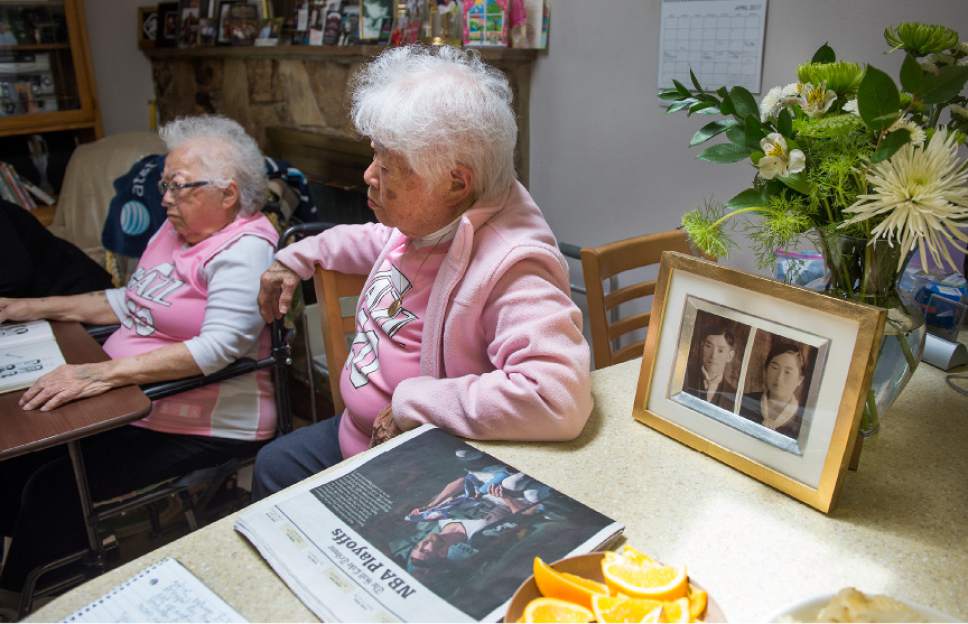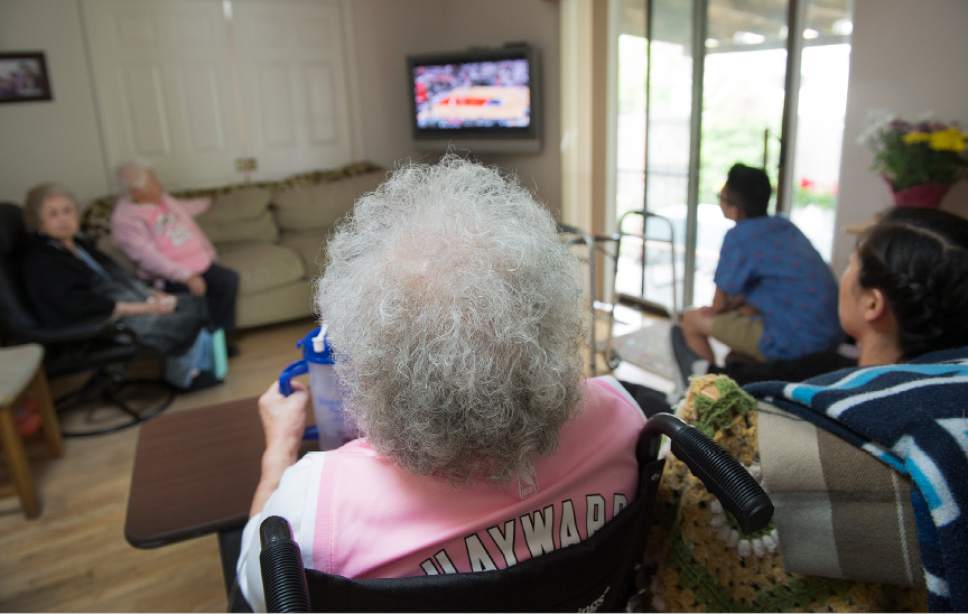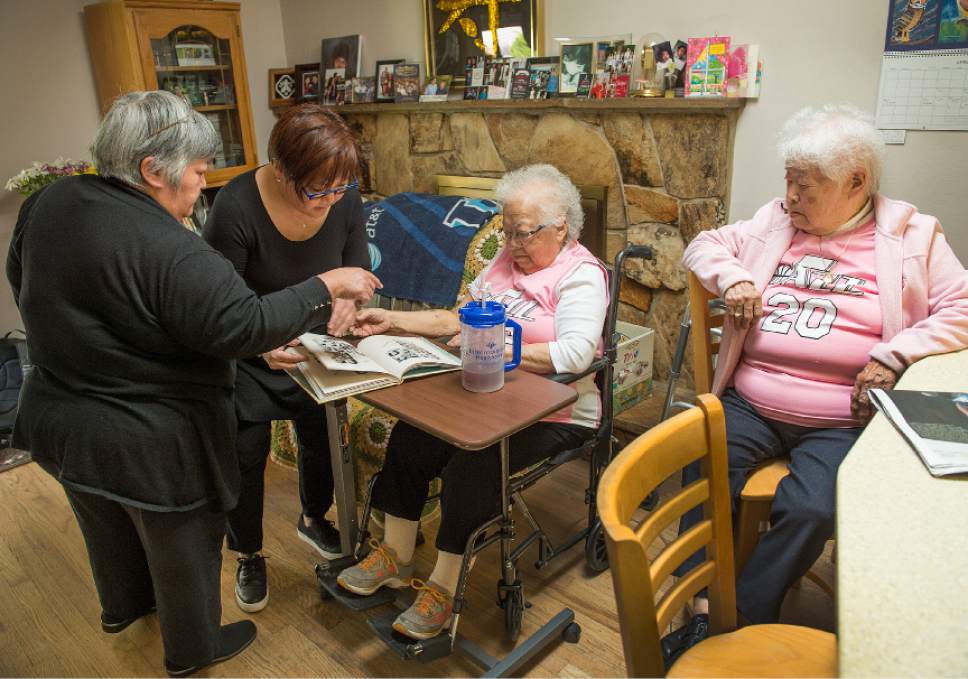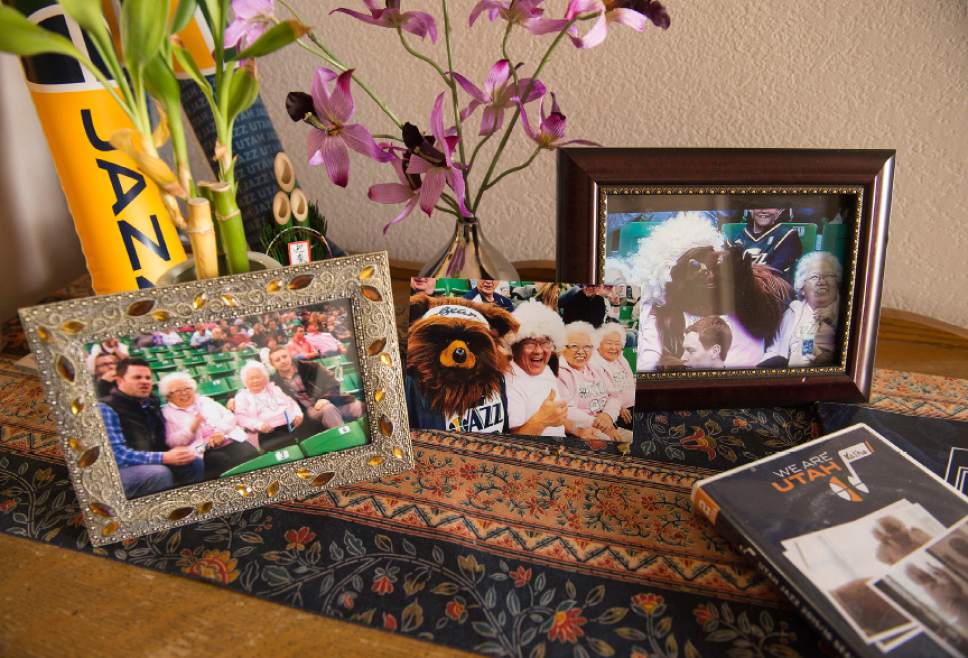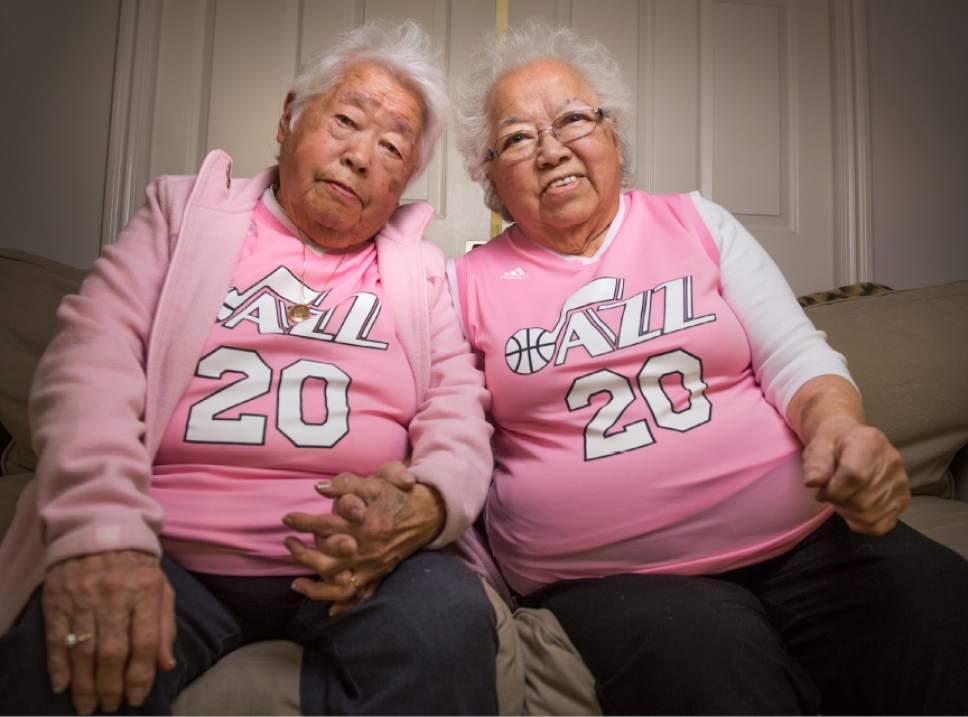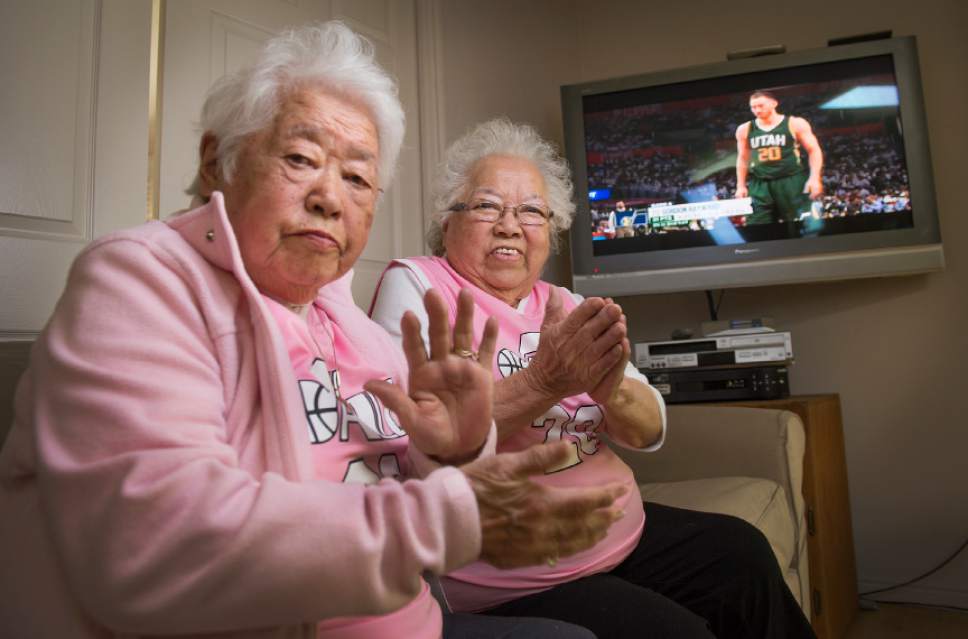This is an archived article that was published on sltrib.com in 2017, and information in the article may be outdated. It is provided only for personal research purposes and may not be reprinted.
Murray • Yeiko Homma didn't smile for nearly three hours Sunday afternoon.
She didn't say more than a sentence at a time, and her eyes barely left the television, even during commercial breaks. Almost the only contact she had with the outside world was through her hands: Her left hand stroked the fur of Chibi, the family schnauzer sitting in her lap. Her right hand was clasped to that of her sister, Keiko Mori, who sat in a wheelchair beside her, equally intent.
For Homma, 92, and Mori, 88, being fans of the Utah Jazz is serious business.
Sure, they've been known for their smiling faces and wispy crowns of white hair in Section 7, Row 12, where they've become as much a part of Vivint Smart Home Arena as the bleachers they occupy. But when the game is on, so are they, following with focus — pausing only to clap during a Jazz basket or an opponent's error.
As Raymond Felton bricked a shot in the second half of Game 7 of the Jazz-Clippers series Sunday afternoon, Homma shouted: "Go and miss some more."
They're called the Pink Grandmas for their attire, and, for the past 20 years, they've charmed the Jazz faithful — and the players and coaches — with their loyalty, sense of humor and the way they stick out from the crowd despite being half as tall as the players for whom they cheer.
Beyond their novelty, the sisters — born and reared half a world apart — aren't just dedicated to the Jazz, but to each other. When Mori went to Intermountain Medical Center (IMC) for seven days last week, Homma joined her by her bedside, donning pink Gordon Hayward jerseys to cheer for the Jazz the same way they have for two decades.
The women were at Mori's Murray home Sunday, surrounded by a dozen family members. Wherever Mori watches, that's where Homma watches.
"We go together," Homma said. "That's how we do it."
—
'I know you, Pink Lady' • The Utah Jazz hosted a fan meetup with recently added team members not long after the 2014 NBA draft. Dante Exum was there. Rudy Gobert was there.
The Pink Grandmas had one of the longest lines for pictures.
"We had no idea that they had such a following until a few years ago," said Theresa Sueoka, one of Mori's four children. "There's not a game that goes by where I don't get a text from a friend, 'Oh, I saw your mom.' "
The 20-year season-ticket holders have accumulated enough local celebrity that they're just as in demand for pictures as anyone else in a Jazz uniform. Their aisle seats are visited by fellow Jazz loyalists, they've starred in a commercial for Jazz season tickets and they frequently are recognized on the street, whether they're wearing their signature pink jerseys or not.
More than a few fans have donned white perm wigs and pink shirts in homage. So has the Jazz Bear.
"Other than Jerry Sloan," radio play-by-play man David Locke said, "they get the loudest applause when they're on the JumboTron."
Mori and Homma started wearing pink to be seen. It started for only one person to keep track of where they were. A family friend, Brad Nakamura, bought them pink jackets so he could see them from his seat across from the basket.
More and more people took notice, including coaches and players. Among the most frequent visitors to Section 7 are Locke and Becky Lindsey, the wife of Jazz general manager Dennis Lindsey. Mori said she recently ran into Sloan, the former Jazz coach, in public — they share an audiologist.
"He said, 'I know you, Pink Lady,' " she recalled. "Then he gave me a hug."
The sisters have been coming for at least 20 years, since their children started giving them lower-bowl tickets. Mori's husband, Jiro Mori (who died in 2013), was also an avid Jazz fan but preferred watching from the comforts of home. So Mori instead would go with Homma, taking TRAX 9 miles to the arena, always among the first fans to arrive.
"It's the atmosphere," Mori said about why she keeps coming back [though family members now drive her]. "It's just special to be there."
The best estimate anyone has is that the sisters have seen more than 600 games live. No one knows for sure, in part because they don't keep old tickets.
"They keep turning them in for Big Macs, Subway and Chick-fil-A sandwiches," quipped Stephanie Mori-Nakao, another of Mori's daughters.
Their tenure is better tracked by their favorite players through the years. They've loved Deron Williams, Derek Fisher, Kyle Korver and Paul Millsap as Jazzmen, and they followed them even after they left Salt Lake City. The current heartthrob is All-Star Gordon Hayward. Said Mori: "He has a nice haircut."
With the rise of social media, Mori's and Homma's families became more aware of their celebrity and decided to make an outlet for it. Mori's granddaughter Kamauri Yeh worked at Twitter when she created an account, @PinkGrandmas, to track their whereabouts and share pictures. She sent a companywide email letting her co-workers know about her grandmother's and great-aunt's growing social media presence.
Twitter CEO Jack Dorsey wrote back: "Absolutely amazing. I'm following."
—
'It was just natural' • The Oki family had a reunion in 2004. They packed into a bus and drove to Ely, a town of just over 6,000 in eastern Nevada. There's a picture of the three dozen relatives crowded in front of a tree, and a sliver of the white, one-story home Tsuzuki Oki built with his hands emerges just in the upper corner of the frame.
The home felt just as crowded with Mori, born in 1929, while growing up in it with three of her other siblings. Her father, Tsuzuki Oki, had immigrated from Japan in 1900 to work on railroads, and he also worked as a copper miner. Her mother, Yayo Oki, raised and butchered hogs — she fed them the throwaway scraps from restaurants.
While four children lived on the Nevada homestead, the family was not complete. Four other children lived in Japan, including Homma, who had been born in Nevada in 1925. Mori was born in Japan but came over by boat when she was 3 months old — old enough to be vaccinated for smallpox, but not old enough to have any memory of her sister.
The family was rocked by World War II, when the two countries the family lived in abruptly went to war.
Life was particularly hard for Japanese-Americans after Pearl Harbor. While Mori remembers her school principal making an impassioned plea to students not to treat those of Japanese descent differently, not everyone took heed.
Ely was so small and remote that the U.S. government, which sent more than 110,000 Japanese-Americans to internment camps, didn't bother sending for the Oki family. But that didn't mean that the Okis were free. They were told explicitly by neighbors not to leave their house at night.
"They said, 'You killed my father. You killed my brother,' " Mori recalled. "They told us if we came outside after dark, they would kill us."
Homma felt the touch of war even closer to home, working in Kumamoto as a secretary at a factory that produced fighters and bombers. She saw American B-29s flying overhead every day near the war's end, preparing to drop death on Japanese cities. Nagasaki, where the second atomic bomb was dropped, is 50 miles from Kumamoto.
Two of the four Oki siblings living in Japan died while Homma was there.
"My mom got tough because of the war," said Donna Homma-Goeller, one of Homma's three children. "I've only seen her cry twice in my life."
War ended, life sped along, yet the siblings grew up an ocean apart. But when Mori was pregnant with her second child in the early 1950s, the Okis decided it was time to bring Homma back to the country where she was born. She arrived in Salt Lake City as a seamstress who spoke little English. Mori, who spoke Japanese at an elementary level, met her sister for the first time.
The two don't know when it became clear they would get along. It may have been those days before Mori gave birth, when they canned peaches and tomatoes together. It may have been after Homma married a chicken farmer in Murray and Mori drove her sister (who didn't have a license) around the valley to deliver eggs. It might have been as they baked cookies together — something for which they're still famous among their family members.
"It took a little while," Mori said. "But it wasn't like we were strangers. It was just natural."
As their lives have gone on, the distance between the sisters has gotten shorter and shorter. Homma moved four houses down the street from Mori a few years ago — close enough to walk over every day with her dog, Lucky. They talk, cook and watch Jazz games, almost always together.
"We take a lot of naps, too," Homma said.
—
'I'll be back' • The sisters have another thing in common: They can be cavalier about using their hearing aids. Sometimes, they wear them. Sometimes, they don't, and the volume of the television blares so loud that the family jokes that neighbors across the street can hear.
But something pricked Homma's ears two weeks ago as she watched TV: silence. Mori's daily ritual of chatting with their surviving sister in California, Miyoshi Marumoto, had fallen out of the background noise.
"It was really quiet," Homma said. "I turned around, and my sister is on the floor."
Mori had spilled out of a high chair at the kitchen counter, unconscious. With Marumoto on the phone, Homma didn't know how to dial out to 911 from the house. She ran to the backyard, where a neighbor was working on a fence, and shouted at him to get help.
Mori was in the intensive care unit at IMC within 30 minutes of the episode. She doesn't remember what happened for the next few days — she either was passed out or on medications that made her hazy.
Doctors told her she had a seizure, caused by low levels of sodium. Even after she was released from the hospital last week, she has had to monitor closely her fluid intake and her diet.
Her family, sprinkled throughout the Salt Lake Valley, has come to her house to help take care of her.
Homma's and Mori's husbands have died, but their companionship has helped fill days, whether it's at Jazz games or sleeping on Mori's couch.
With the Jazz advancing to the Western Conference semifinals against the Golden State Warriors after defeating the Clippers on Sunday, there are at least two more home games left in the postseason. It's too early to know whether Mori will be able to attend, but just as she is with the Jazz (who lost Game 1 to the Warriors), she is optimistic: "I'll be back."
So, too, are Utah Jazz fans, who have written hundreds of messages to the Pink Grandmas' Twitter account in the past week — an overwhelming tide of support that Mori didn't know she had. Homma and Mori said they were surprised as family members read them.
"All the best, get well soon."
"#JazzNation is rallying for you."
"WE LOVE YOU!"
They've built their own fan base. And it just wouldn't be the same if it was one without the other.
"It's kind of perfect," Sueoka said. "Two tickets; two ladies in pink for 20 years. Who can forget that?"
Twitter: @kylegoon


